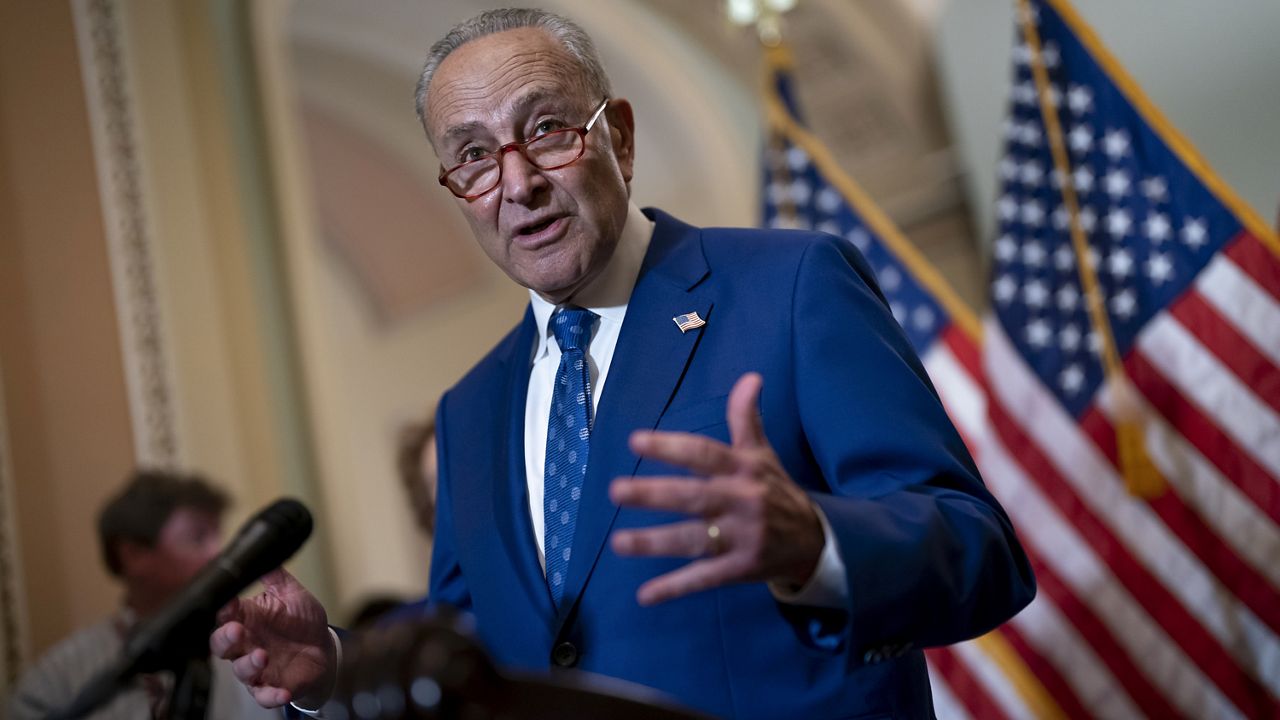Chuck Schumer Facing Scrutiny Over New Investigation
Senate Minority Leader Chuck Schumer (D-NY) is currently under investigation following remarks he made in 2020, which were interpreted by many as threats against Supreme Court Justices Brett Kavanaugh and Neil Gorsuch. These comments, made on the steps of the U.S. Supreme Court, came amid concerns that the Court might overturn Roe v. Wade, a decision that was ultimately reversed in 2022. Schumer’s statement, which suggested the justices would “pay a price” if they voted to overturn the landmark ruling, raised questions about the responsibility of public figures in making statements that could be seen as intimidating. In this article, we’ll explore the background of Schumer’s comments, the investigation, and the broader political implications.
Schumer’s Controversial Comments: Political or Threatening?
The controversy began in March 2020, when Schumer addressed a crowd outside the U.S. Supreme Court, specifically targeting Justices Kavanaugh and Gorsuch. Both justices had been appointed by President Donald Trump and were seen as crucial in the potential rollback of abortion rights. Schumer told the crowd, “I want to tell you, Gorsuch, I want to tell you, Kavanaugh, you have released the whirlwind and you will pay the price. You won’t know what hit you, if you go forward with these awful decisions.” His words were widely interpreted as a veiled threat against the justices, implying political consequences if they ruled to limit abortion rights.
Schumer’s remarks, including phrases like “pay the price” and “you won’t know what hit you,” were perceived by many as intimidation directed at the justices. Critics argued that such language, coming from a high-ranking public official, could incite further hostility toward the judiciary. Supporters of Schumer, however, maintained that his comments were simply a reflection of his opposition to the possible overturning of Roe v. Wade, not a literal threat.
Public Backlash and Schumer’s Response
The backlash to Schumer’s comments was swift. Conservative lawmakers and media outlets condemned the remarks, accusing Schumer of trying to influence judicial decisions and undermining the independence of the judiciary. In response, Schumer attempted to clarify his words, stating that he should not have used the language he did but suggesting that the controversy was being manipulated by conservatives. While he did not offer a full apology, Schumer expressed regret over the choice of words but insisted that his criticism was aimed at the justices’ potential rulings, not their personal safety.
Despite Schumer’s attempt to ease tensions, an ethics complaint was filed, but it did not result in any significant consequences for him at the time. The controversy largely faded, and Schumer continued with his political career.
Investigation: A New Scrutiny on Schumer’s Words
Fast forward to January 2025, when Interim D.C. U.S. Attorney Ed Martin announced that a preliminary inquiry had been launched into Schumer’s 2020 remarks. The investigation aims to determine whether Schumer’s comments about the justices could be considered threats that could lead to legal action. Martin’s letter, confirming the investigation, emphasized the seriousness of threats against public officials, indicating that authorities were closely examining the situation.
Defenders of Schumer argue that his words were not intended as a personal threat, but rather a political expression of frustration. They believe Schumer was criticizing the justices’ legal interpretations, not inciting harm against them. Opponents, however, contend that such inflammatory language from a prominent figure can have dangerous consequences, potentially fostering a climate of fear or encouraging violence.
Schumer’s History of Outspoken Remarks
Schumer has a long history of making provocative statements, particularly in the realm of partisan politics. His 2020 remarks about Kavanaugh and Gorsuch are just one instance of his outspoken rhetoric. In 2017, for example, Schumer made headlines for his comments on President Trump’s relationship with the intelligence community, warning that there would be retribution if Trump continued to confront them. Critics viewed this as a veiled threat, although Schumer later clarified that he intended to caution the president about the power of intelligence agencies.
Schumer’s tendency to make bold, often controversial remarks has stirred debate about the role of public officials in shaping political discourse. His comments on Kavanaugh and Gorsuch, though not the first of their kind, have reignited discussions about the responsibility of politicians to speak in ways that foster healthy democratic debate without veering into dangerous territory.
The Larger Debate: Political Speech and the Law
The ongoing investigation into Schumer’s comments highlights the fine line between political expression and potential incitement. In today’s polarized political environment, the role of rhetoric has become more significant than ever. While public officials are entitled to express their views, the question remains: where should society draw the line between free speech and speech that could be interpreted as a threat?
Schumer’s remarks about the justices, combined with his history of contentious rhetoric, underscore the challenge of ensuring that political speech remains civil while still allowing for vigorous debate. The investigation into Schumer’s comments will ultimately determine whether legal action is warranted, but it has already raised important questions about how public figures should conduct themselves in a politically charged climate.
Conclusion: The Road Ahead for Schumer
The investigation into Schumer’s controversial remarks is still ongoing, and its outcome could have lasting consequences for both Schumer’s political career and the broader debate over political rhetoric. While some view Schumer’s comments as an overreaction to the threat of Roe v. Wade being overturned, others believe his language crossed a line and set a dangerous precedent. As the investigation unfolds, the political world will be watching closely, and the broader debate about the role of rhetoric in public life will continue to evolve.
